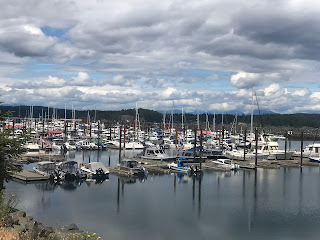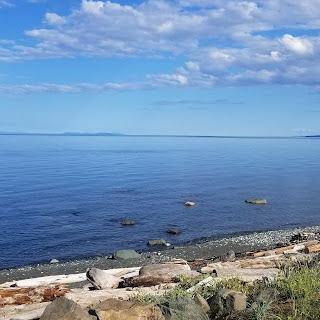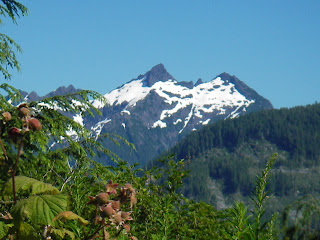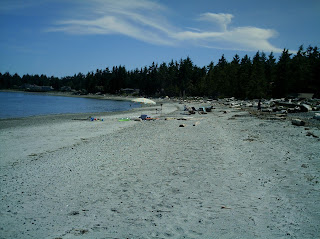The coast of BC has over 40 designated marine parks. These are parks that include both water and land areas but are generally accessible by float plane or boat only (with some exceptions). Many of them allow wilderness camping but only a few offer even basic services (an outhouse, water, cleared campsites).
Thursday, 15 June 2023
Marine Parks
Thursday, 18 May 2023
BCO Coastal Gems: Campbell River
The BC Oceanfront Real Estate Team services a large area of Vancouver Island and the coastal region of BC, and we know that every village, town and city on Vancouver Island offers its own beauty and sense of community.
We all chose Campbell River because it offered the best of both worlds - the amenities and services of a city with the abundance of natural beauty surrounding it being easily accessible for recreation. Whether we want to fish on the ocean, explore the local forests, ski or hike in the mountains, relax on a beach, or swim at a lake, we can access it all within 30 minutes of Campbell River.
Campbell River continues to grow as a city, with a new hospital built six years ago and new construction happening regularly. North Island College campus provides post secondary opportunities. While the city has long been and continues to be a central hub for the coastal resource sector it is also diversifying in its economic base.
Along with a diversifying economy comes a diversifying population. Traditionally the population base came mainly from the resource sector and service sector, but in recent years retirees have discovered the beauty of the area and there has also been a growth in the immigrant community.
Thursday, 26 May 2022
BCO Coastal Gem: Tahsis
The coastal village of Tahsis sits at the head of protected Tahsis Inlet, on the West Coast of Vancouver Island near Nootka Sound. Tahsis is a (gravel) road access village, with services and shopping. It has a K-12 school, a recreation centre with swimming pool, bowling alley, workout room, gym and climbing wall, post office, hardware store, convenience store with gas station and restaurant, and a mechanic. Services include a medical clinic, ambulance, coast guard station and volunteer fire department. Campgrounds and B&Bs provide accommodation.
Tahsis offers access to a number of wilderness hiking trails, caving, incredible ocean kayaking, scuba diving, wind surfing, sailing and canoeing. The area is best known for offering world-class sport fishing as massive runs of salmon migrate down the west of British Columbia to their spawning grounds in coastal streams and rivers. Anglers can also venture out to the Pacific Ocean where fishing is excellent for halibut, flounder, rockfish and lingcod. Crabs, prawns, shrimp, oysters and other seafood are also plentiful. Wildlife abounds! Black bear, wolves, cougars, Roosevelt elk and coastal black-tailed deer are frequent visitors to this area. Guests from around the world marvel at the eagles, sea lions, whales and other marine wildlife that is common in the nearby waters.
The picturesque and versatile west coast village offers a full-service marina and a safe, friendly small town atmosphere that boasts an incredible blend of outdoor adventures and some of the most rugged and breathtaking scenery in British Columbia, Canada.
To find out more about this coastal community, click here!
It's a Coastal Lifestyle ... Live It!
Thursday, 14 April 2022
8 Steps for Preparing for a Recreational or Remote Listing
Ready to sell a recreational property, or your remote residence? Here are some tips to make both the listing and showing process go smoothly. The more of these things that can be done ahead of a site visit, the better for both the photos and site description used our marketing materials.
2. Grounds
While people expect to see some equipment, etc on the grounds, have
you cleaned up the extra items? Are they neatly put away, or scattered around
the property? A general clean up of the grounds is advised. This includes
winter blow-down of branches, etc.
If there is a residence on the property, has it been cleaned? Are
there belongings left out or are they put away? The neater it can be left, the
better. Do the doors/windows stick? Are there small repairs or projects that
can be finished which will enhance the showings? Do you have a spare key to provide us or can one be hidden at the property?
6. Outbuildings
Any outbuildings on the property should be accessible and in a
reasonable state of cleanliness.
8. Septic System
If there is a septic system on the property, marking the pipes, tank
location, etc is a big help, and having any paperwork related to the system on
hand is a benefit.
Thursday, 22 July 2021
Vancouver Island Beaches Perfect for Summer
Summer on Vancouver Island is generally warm, sunny and dry – perfect beach weather. This top 5 list is for beaches outside of Victoria that are perfect for summer relaxing.
Friday, 26 March 2021
Northern Vancouver Island Parks
1. At the top of the island is the famous Cape Scott. While people think of this as a serious hiker's park (for the well-known Cape Scott Trail) it has some easily accessible day-use areas, including the beautiful sandy San Josef Bay. Wilderness camping is allowed in this park, but there are no services. Just outside the San Josef entrance there is a private campground with cleared sites and picnic tables.
4. Marble River, at the edge of Quatsino Sound, is an easy river park to access (via logging roads) and there is a forestry campsite just outside the park boundary. Marble River offers hiking and biking trails as well as good angling.
A number of the parks on the north island are much more difficult to access and in fact some are almost inaccessible. Much of the access into the northern portion of the island is dependent on logging roads, and once a road is deactivated it is no longer serviced and can quickly become impassible. This has happened with the Artlish Caves Provincial Park, where there is now a hike in to the park as the logging road access was deactivated several years ago. These parks have been established to protect sensitive habitats and ecosystems, so creating access is not a priority for the parks program.
You can discover all the provincial parks (and ecological preserve areas) through the BC Parks website. A good place to start is the geographical locator page, which lets you zoom into the region you want to explore.
Vancouver Island north of Campbell River is a massive space that may seem empty as the communities are small and spread out, but for the intrepid explorer there are some beautiful areas to discover. Doing a circuit of Provincial Parks is just one way to get out there.
Thursday, 11 March 2021
East Side vs West Side Vancouver Island
Most people don't think of islands as being very different from one side to the other. But Vancouver Island is a bigger island than many people realize and it differs greatly from one coast to the other.

Thursday, 3 September 2020
Be Prepared When Travelling Remote Areas
Many of the properties we market are remote and we love them as do our clients. They are accessed via Forest Service Roads, private gravel roads, water, and long stretches of unserviced highway. There is often no cellular service, and certainly no wi-fi. So if you are going to travel in these regions remember the number one rule: Be Prepared.

Vehicle:
Have a spare tire! In addition, a shovel to dig out (from dirt or snow), a mat to lay down on when you look under the vehicle, and a vehicle that can withstand scrapes from overgrown shrubs and trees are all assets. Remember that having warmer temps in town does not mean there won't be snow on the ground in the more remote areas. For some areas, a saw to take apart small windfall that's across the road could be useful.
Communication:
Make sure people know where you are going and your approximate time of return. Letting people know your route ahead of time is also a good idea. We always ask people who want to just go look at a property on their own to tell us when they return. Have good maps with you so you can identify where you are, especially if you need to walk out to a more main road for assistance.
Supplies:
A first aid kit is important. Extra food and water as it may take longer than you'd expect. Good footwear. Warm clothes and a rain coat (even in the middle of summer) as the weather can change quickly on the coast! And for those of you who prefer the comforts of home, a spare roll of toilet paper is nice.
We love the coastal wilderness we are surrounded by, and if you are prepared then enjoying it and exploring it can be a great way to spend time.
Thursday, 20 August 2020
Visiting BC's Marine Parks
A lot of people are exploring the more outdoor and open areas of the coast this summer, as a way to safely social distance and yet still enjoy summer. Marine parks are a great option for those who have boating access - whether power boats, sailboats or kayaks.
The coast of BC has over 40 designated marine parks. These are parks that include both water and land areas but are generally accessible by float plane or boat only (with some exceptions). Many of them allow wilderness camping but only a few offer even basic services (an outhouse, water, cleared campsites).
Thursday, 23 July 2020
Making Room for Your Coastal Lifestyle
With all that recreation, however, comes equipment. And if you are moving here to take advantage of the great outdoors, thinking about where you are going to keep your equipment is important.
Are you thinking of downsizing so you can spend time RVing? Then you need to have somewhere to store your RV. Coming here to fish on the ocean or lakes? Will you have a boat and if so, where will you keep it? Skis, ATVs, mountain bikes, kayaks - all need a place to sit when not in use.
Listings in this region should tell you if RV parking, extra outdoor space and good storage space is available. Most properties allow these types of outdoor items, although there are still some neighbourhoods that do not, so check if there are any covenants on the title restricting property use.
When you come to the area, come prepared to take advantage of all it offers and make sure your home allows you to easily access what you need. Whether that means a sturdy pair of walking shoes or a state-of-the-art RV beside the house is completely up to you!
It's a Coastal Lifestyle ... Live It!













































